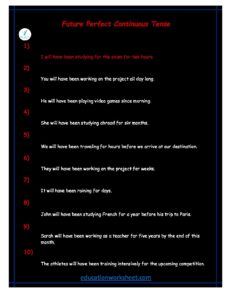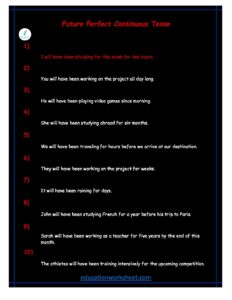how to converting Future Perfect Tense negative sentences to positive form
how to converting Future Perfect Tense negative sentences to positive form
The Future Perfect Tense is a grammatical structure used to describe actions or events that will be completed in the future before a specific point in time. To convert negative sentences in the Future Perfect Tense to their positive form, it’s essential to understand the structure of the tense and how negation works in English grammar. In this comprehensive guide, we will delve into the intricacies of converting Future Perfect Tense negative sentences to their positive counterparts.
I. Understanding the Future Perfect Tense The Future Perfect Tense

is formed by using the future auxiliary verb “will have” or “shall have,” followed by the base form of the main verb and the past participle. This tense is typically used to convey that an action will be completed before a specific point in the future. Here’s the basic structure:
Positive Form: Subject + will have/shall have + past participle
Negative Form: Subject + will not have/shall not have + past participle
II. Converting Negative to Positive

Converting negative sentences in the Future Perfect Tense to their positive form involves reversing the negation. To do this, you simply remove the negative auxiliary “not” (in this case, “will not” or “shall not”) and retain the “will have” or “shall have.” The resulting structure will be a positive sentence in the Future Perfect Tense.
Let’s look at some examples to illustrate the process:
- Negative Sentence: They will not have finished the project by tomorrow. Positive Sentence: They will have finished the project by tomorrow.
- Negative Sentence: She shall not have completed her studies by the end of the semester. Positive Sentence: She shall have completed her studies by the end of the semester.
- Negative Sentence: I will not have seen the new movie before it’s released. Positive Sentence: I will have seen the new movie before it’s released.
III. Additional Considerations
While the process of converting negative sentences in the Future Perfect Tense to positive sentences is straightforward, there are some nuances to keep in mind:
- Verb Forms:
- The base form of the main verb and the past participle remain the same in both positive and negative sentences. Only the auxiliary verbs change.
- Modal Verbs:
- If you’re using modal verbs like “may” or “might” in the negative sentence, they should be retained in the positive sentence. For example, “She may not have completed her assignment” would become “She may have completed her assignment.”
- Contracted Forms:
- In informal writing or speech, you may come across contracted forms of negations (e.g., won’t for “will not” and shan’t for “shall not”). To convert these to positive sentences, you expand the contractions. For instance, “They won’t have arrived by then” becomes “They will have arrived by then.”
- Time References:
- The key to using the Future Perfect Tense effectively is specifying a particular point in the future when the action will be completed. This point could be a specific time, date, event, or another reference. When converting negative sentences to positive form, ensure that this point in the future is maintained for clarity.
IV. Practice Exercises
To solidify your understanding of converting Future Perfect Tense negative sentences to positive form, here are some practice exercises:
- Negative Sentence: He will not have eaten dinner by the time we arrive. Positive Sentence: _______________________________________________________________________
- Negative Sentence: They shall not have left for the airport before the storm hits. Positive Sentence: _______________________________________________________________________
- Negative Sentence: She may not have finished writing her book before her birthday. Positive Sentence: _______________________________________________________________________
- Negative Sentence: I won’t have prepared the presentation by the meeting. Positive Sentence: _______________________________________________________________________
- Negative Sentence: We might not have found a solution to the problem by the end of the day. Positive Sentence: _______________________________________________________________________
how to converting Future Perfect Tense negative sentences to positive form


